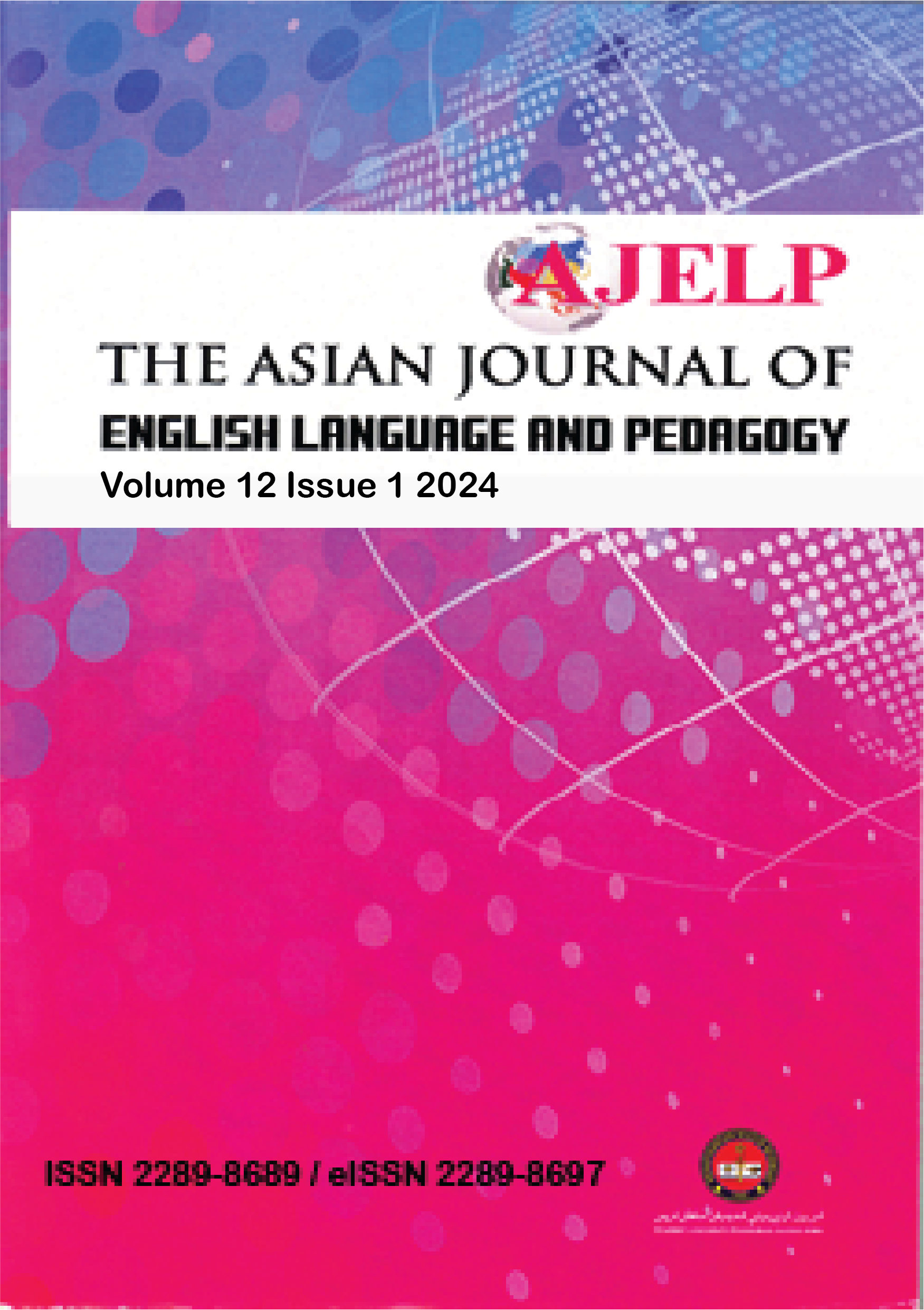The Effects of Listening Comprehension Strategies Instruction on ESL Learners Achievement in English Studies: An Empirical Study.
DOI:
https://doi.org/10.37134/ajelp.vol12.1.2.2024Keywords:
English Studies, listening comprehension strategy, genderAbstract
The purpose of this study was to find out the effect of listening comprehension strategies instruction on junior secondary school students’ achievement in English Studies. The research design is based on a quasi experimental non-randomized pretest, and posttest control group design. A total of 499 students constituted the sample size drawn from the three (3) sampled schools of an all-girls, a coeducational and an all-boys junior secondary schools in Edo State, Nigeria. One intact class in each of the schools used was randomly selected and assigned to an experimental and a control group. Those in the experimental group were taught listening comprehension strategies, while those in the control group were not taught listening comprehension strategies. One instrument titled English Studies Examination Questions (ESEQ) was used to collect the data for the study. The data collected were analyzed using independent sample t-test and analysis of variance (ANOVA) to test the hypotheses at alpha level of 0.05 significance. Results obtained from data gathered indicated that subjects in the experimental group taught listening comprehension strategies performed better than the subjects in the control group not taught listening comprehension strategies. Female students in the experimental group performed better than the male students in the experimental group. It was recommended among others that English Studies teachers should teach listening comprehension strategies in the language classroom.
Downloads
References
Badian, N. A. (1999). Reading disability defined as a discrepancy between listening and reading comprehension. Journal of Learning Disabilities, 32, 138-148.
Bergman, O. (1999). Wait for me! Reader control of narration rate in talking books. International Reading Association's Reading Online. Retrieved February 2, 2009, from www.readingordine.arg /articles /art _index.asp?HREF =bergman/ index.html
Berninger, V. W. (2000). Development of language by hand and its connections to language by ear, mouth and eye. Topics in Language Disorders, 20 (4), 65–84.
Berninger, V. W., Abbott, R. D., Jones, J., Wolf, B. J., Gould, L., Anderson-Youngstrom, M., et al. (2006). Early development of language by hand: Composing, reading, listening, and speaking connections; Three letter-writing modes; and fast mapping in spelling. Developmental Neuropsychology, 29 (1), 61-92.
Bozorgian, H. (2012a) Listening skill requires a further look into second/foreign language learning. International Scholarly Research Network ISRN Education Volume 2012. Article ID 810129, 10 pages doi:10.5402/2012/810129
Bozorgian, H. (2012b). The relationship between listening and other language skills in international English Language testing system. Theory and Practice in Language Studies, 2 (4), 657-663.
Feyten, C. M. (1991). The power of listening ability: An overlooked dimension in language acquisition. The Modern Language Journal, 75 (2), 173-180.
Field, J. (2008). Bricks or mortar: Which parts of the input does a second language listener rely on?” TESOL Quarterly, 42 (3), 411-432.
Fisher, C.J., & Terry, C.A. (1995) Children’s language and the language arts. Boston: Allyn and Bacon.
Gardner, R. C., Masgoret, A. M., Tennant, J., & Mihic, L. (2004). Integrative motivation: Changes during a long intermediate level language course. Language Learning, 54 (1), 1–34.
Goh, C. C. M. (2008). Metacognitive instruction for second language listening development: Theory, practice and research implications. RELC Journal, 39 (2), 188–213.
Goh, C., & Taib, Y. (2006). Metacognitive instruction in listening for young learners. English Language Teachers Journal, 60 (3), 222–232.
Gurian, M., Henley, P., & Trueman, T. (2001). Boys and girls learn differently! A guide for teachers and parents. New York, NY: Jossey-Bass.
ILA, (2012), Definition of listening. International Listening Association. Retrieved Nov. 15, 2014, from http://www.listen.org
James, A. N., & Richards H. (2003) Escaping stereotypes: Educational attitude of male alumni of single-sex and coeducational schools. Psychology of Men and Masculinity, 4, 136 – 148.
Linda, B., & Brown, L. A. (2002). Metacognitive skills and reading. In P. D. Pearson, M. Kamil, R. Barr, & P. Mosenthal, (Eds.), Handbook of Reading Research. New York: Longman
Linebarger, D. L. (2001). Beginning literacy with language: Young children learning at home and school. Topics in Early Childhood Special Education, 21, 188-192.
Mareschal, C. (2007). Student perceptions of a self-regulatory approach to second language listening comprehension development. PhD. Thesis. University of Ottawa, Ottawa, Canada.
Morris, T., & Leavey, G. (2006). Promoting phonological awareness in nursery-aged children through a sure start early listening programme. International Journal of Early Years Education, 14 (2), 155-168.
Osa-Omoregie, O., D. & Gbenedio, U. B. (2017). The relative effectiveness of the task-based method and the direct method of teaching listening skills at the junior secondary school levels. African Journal of Curriculum and Instructional Technology,1 (1), 71-85. University of Benin, Benin City, Nigeria.
Park, G. P. (2004). Comparison of L2 listening and reading comprehension by university students learning English in Korea. Foreign Language Annals, 37 (3), 448–458.
Sax, L. J. (2005). Why gender matters. New York, NY: Doubleday.
Shanahan, T. (2006). Relations among oral language, reading and writing development. In A. C. MacArthur, S. Graham, & J. Fitzgerald (Eds.), Handbook of Writing Research. New York: Guidford Press.
Vandergrift, L. (2004). Listening to learn or learning to listen? Annual Review of Applied Linguistics, 24, 3–25.
Vandergrift, L. (2007). Recent developments in second and foreign language listening comprehension research. Language Teaching, 40, 191-210
Willis, J. (1996). A framework for task- based learning. Harlow: Longman.
Yalcinkaya, F., Muluk, N. B., & Sahin, S. (2009). Effects of listening ability on speaking, writing and reading skills of children who were suspected of auditory processing difficulty. International Journal of Pediatric Otorhinolaryngology, 73 (8), 1137–1142.
Zhang, L. J., & Wu A. (2009). Chinese senior high school EFL students’ metacognitive awareness and reading-strategy use. Reading in a Foreign Language, 21 (1), 37–59.
Downloads
Published
How to Cite
Issue
Section
License
Copyright (c) 2024 Omawumi Doreen Osa-Omoregie

This work is licensed under a Creative Commons Attribution-NonCommercial-ShareAlike 4.0 International License.





